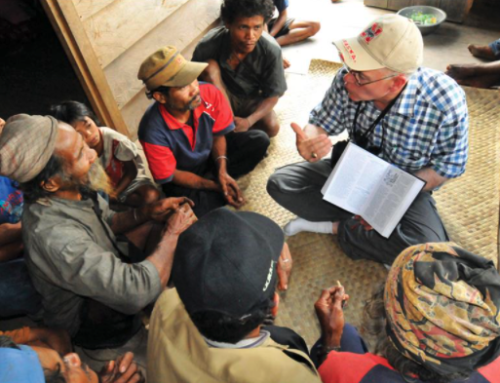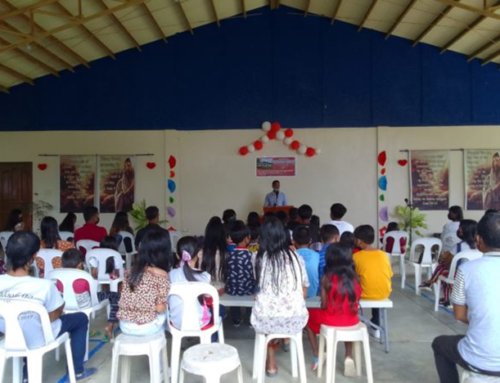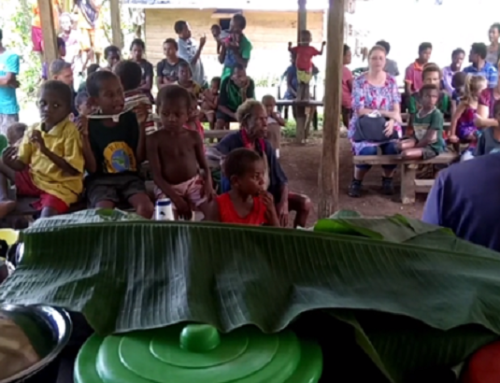The ocean waves slapped against the sides of the boat as it beached along the sandy shore of the Palawan island of the Philippines. Missionary Jody Crain scanned the shoreline for a welcome party, but there was none to be found. No men waited to greet him on the beach; only faces peered out from behind the palm trees just beyond the shoreline.
Setting disappointment aside, Jody focused on the task at hand. There were barrels to unload, and time was of the essence. With pirates frequenting the island waters, not even seasoned fishermen dared to be out on the waters past the 3 p.m. dock curfew. There was work to be done.
Sinewy, strong arms of fishermen hoisted the heavy barrels from the boat for Jody to roll up on the sandy shore. This was unknown territory for them, and they had no plans to disembark.
Therefore, the task fell to Jody to begin the backbreaking task of rolling the first of seven barrels to the house that his family would call home for the foreseeable future. But it didn’t feel like home, at least not yet.
The house was indistinguishable from any other of the villagers’ houses. The structure was raised above the ground with woven bamboo walls and a bamboo roof. Jody rolled the barrel against the house poles and stood up, stretching to his full height and working out the tension in his back. Turning back toward the ocean, a different type of tension surfaced, along with disappointment and a strange feeling of solitude.
The boat that was to take him back to the main island and to his wife, Barbara, and their young son had left. It was almost out of sight, and Jody could just hear the faint noise of the two-cylinder diesel engine fading in the distance. Obviously, and with reason, the fishermen were more concerned about the risk of facing pirates than they were with getting Jody back to the mainland.
By the time Jody had rolled all seven barrels up to the house, it was apparent that there wasn’t going to be a welcoming party. No one came out to greet him. No men. No women. A few children poked their heads from behind doorways and bushes, daring to venture in his direction before quickly retreating again. But that was it. And that was to be expected. Later Jody was to learn that all but two men, one sick and one really old, had gone north about an hour on a two-day fishing trip. And in a culture where wife stealing was rampant, no woman would dare approach Jody. He was still an unknown element, still not to be trusted. That would change, but not on that day.
Night had fallen before Jody headed into the house for the night. A storm was brewing. By the light of a candle, Jody headed to the bedroom, thankful to see a bed with sheets and a pillow on it. A mosquito net hung loosely over the bed. He made his way around the bed, tucking the mosquito net under the mattress, securing his bed for the night. The winds were picking up outside, randomly blowing out the candle. After several attempts to keep it glowing, Jody gave up on it, let it blow out and climbed into bed.
Nothing sounded better than stretching out. He lay down, his head nestled in the pillow, his hands behind his head, adjusting the pillow for that perfect night’s rest. That’s what he needed. A good night’s sleep.
And then things began to move. Under his head. Behind his hands. Under his arms. Creepy things. Crawly things. Screeching things. Unknown things that he could not see in the dark.
Jody’s haven of rest was transformed into a living, writhing mass of unknowns scurrying over his body with the potential of biting or stinging or whatever ills the unknowns were capable of unleashing on the unsuspecting missionary. Jody had no intention of finding out. He exited the bed and mosquito net in record time, all the while brushing offending critters from his body—and probably a few extra imagined ones just to be sure.
As the critters—which ended up being rats from a rat’s nest that had settled in the pillow—vacated the premises, the adrenaline coursing though Jody’s veins began to diminish. His heart no longer pounded with the force of a jackhammer. His breaths reverted to something much closer to long and steady. And then he had to determine what to do next.
He looked at the bed—or at least in the direction of where the bed sat. In the darkness, he could see nothing. On an encouraging note, at least there were no more screeching or scurrying noises. Jody would have liked to walk out the front door, jump in the nearest speedboat and head for the mainland where Barbara and his son were, where a bed without rats existed, where normalcy reigned. But that wasn’t an option. There was no speedboat. And it was night. And there were pirates. It was conquer the bed or spend the night sitting on the beach where other possible dangers lurked.
Jody reached for the mattress in the dark, tentatively at first. With sweeping motions, he inspected the bed. When he was confident that the bed was his and his alone, he climbed in, made sure the mosquito net was securely tucked in and stretched out once more. Exhausted physically and drained emotionally, he shut his eyes, ready for some restorative sleep.
But sleep did not come.
Sighing with resignation, Jody opened his eyes, looking up towards the ceiling. As the moon shone through brief breaks in the clouds, there was a muted quality of light that shone through the plexiglass “skylight” in the bamboo roof. Though not enough to shed any real light into the room, there was the comfort of light beyond the house.
And that’s when he saw it, the dark silhouette of a creature larger than a rat, larger than anything that had been in his bed earlier. It moved across the beam, a dark shadow against the muted light. It moved and moved and moved some more. It had to be at least three to four feet long—whatever it was. Jody would guess it had to be some type of iguana or other exotic lizard. And he was okay with it—as long as it stayed up there where it was silhouetted against the night sky, as long as it didn’t decide to visit him down where he was at. He’d had enough excitement for one night. He had no desire to share his bed with any viler creatures.
Sleep. He needed sleep. But the wind was picking up yet more. And above the wind he heard noises. More noises. New noises. New unknowns. Would this night never end?
There was a whirling sound. Swishing. Strange. Eerie.
Followed by a strange che-che … che-che … che-che sound. Sharp. Staccato. Disconcerting.
And finally, a booming sound. A loud thud. Pounding. Earth-shaking.
The booming noise at the end of each repetition could be felt through the house poles. And then it would repeat itself over and over again. Noises that Jody couldn’t place. Noises that didn’t make sense. Noises that had his imagination running—and none of those imaginings were reassuring.
But the house remained where it was. Nothing came crashing through the woven bamboo walls, and surprisingly, sometime in the dark of the night and in the midst of the unknowns, Jody fell asleep. Had he known the source of the strange noises, he might have fallen asleep earlier. He may have even laughed at the fear instilled by something innocent.
he heard noises.
More noises.
New noises.
Jody wouldn’t know it until morning, but those unknown noises were created by the coconut trees that surrounded the house. As the winds whipped up, old palm branches broke loose from the tops of trees, some forty to fifty feet in the air. As they fell, the winds twirled them around causing the whirling sound. Then, as the end of the branch hit the ground, it snapped off in sections, creating the che-che … che-che … che-che sounds. And, finally, the coconut, no longer supported in place by the palm leaf, fell to the ground with a ku-thud. Normal sounds for the jungle, but far from normal for the new missionary.
Morning came, and Jody was awakened by the sound of a man outside his house clearing his throat and coughing, the Tagbanwa way of “knocking” at the door. A less than well-rested Jody climbed from beneath the mosquito net and headed for the door.
That’s when Rebrino welcomed him to the island with a message to share and a letter in hand.
“You are an answer to prayer,” Rebrino told him in Filipino, as he showed Jody the response to a letter sent to the mission back in 1968, when they asked them to send missionaries. “And now you are here.”
The difficulties from the night before melted away as Jody heard the message and read the letter. Now, this was a welcome worth waiting for. Any residual trauma from the night before was insignificant when measured alongside the purpose for which God had brought him to this tropical island. This was where God had brought him for this specific purpose, to bring the gospel to the Tagbanwa people, to teach the Tagbanwa people the truths from God’s Word. All was good.
Fast forward several decades. Jody still tells that story with gusto. That first night in the village was indelibly imprinted on his mind. As a young and inexperienced 24-year-old missionary, he was pushed far outside his comfort zone that first night. But then morning came, and with the light of day came God’s comforting message through Rebrino. God had a purpose for Jody, for his wife and for his family on this isolated island location. He was right where he needed to be.
WHEN TRAGEDY LEADS TO VICTORY
Today there is a thriving church among the Tagbanwa people. And much of this is due to God’s taking the son of a Floridian chicken farmer out of his element, plopping him on a tropical island, and shining through him and his family. When one is willing to say as Jesus said in the Garden of Gethsemane, “Not my will, but thine be done,” there is no end to what God can do through that life.
Saying “yes” to God has been Jody and Barbara Crain’s desire down through the years, even when it meant staying after their house burned down. It happened in 1981. Back from the USA, they were in the village staying with their co-workers while putting the finishing touches on their house. At 3:00 a.m., they were awakened by shouts that their house was on fire. In less than 20 minutes, it was gone, burned to the ground. It wasn’t a night that Jody and Barbara were to forget.


“By morning our co-workers’ porch and yard were full of people,” Jody said. “They were thankful that we were okay, but they were very sad, almost like mourning. They said that they were so sorry that we had to leave, to which we asked ‘why?’ They said the spirits are upset with us for building on that land, and if we didn’t leave, someone in our family would die.
“We and our co-workers discussed the situation and prayed about what our response should be. We decided that we would dig up the burned-off posts. Most of them were burnt almost level with the ground. We put brand new posts back in the same holes as a testimony to God’s protection over us.
“The people were so fearful that we could hardly find anyone who would work on that property in the village for fear of getting sick and maybe dying. In fact, before the fire, the Tagbanwa people used to walk right past where our porch was to go to the ocean to fish. They decided to cut a new trail around the clearing where our house was so that they didn’t even have to walk on the land where our house had been built.”
But no one died, and the villagers kept on watching, taking note of this strange phenomenon.
It wouldn’t be until 2020 during an interview with one of the Tagbanwa church elders that Jody and Barbara would fully comprehend the reason and impact that their house burning down had on the villagers. They did not know at the time that when they put those new house poles back in the very holes of their original house, it would become a turning point for the Tagbanwa people.
It was Amay Limbuan that gave testimony to it. He told Jody, “Your house became a monument, a marker, that stood in contrast to everything we Tagbanwas feared.”
Jody shook his head in amazement as he heard that testimony, a testimony he had never heard before. He said, “We had no idea that God would use a tragedy and a setback from what we thought slowed down our progress in the work to actually open the hearts of the people to the gospel. Not only in that village, but many other villages!”
Despite a rocky start that first night, despite having their home burn to the ground early on in the work, they carried on. They walked by faith and have seen God do what only He can do. By obedience they went, and they have seen God use them to reach the Tagbanwa people with the gospel message and to see the Tagbanwa become not only their brothers and sisters in Christ, but ours also.
WHEN A WITCHDOCTOR’S DAUGHTER CONFRONTS HER FATHER
These church elders, who are now in their late 60s and mid-70s, were saved out of a dark, spirit- filled world where they feared what the spirits would do if they failed to appease them. They offered sacrifices out of obligation and fear. Joy was unheard of. Hope was nonexistent. It was all about survival.
And then the missionaries came. Through foundational, chronological Bible teaching — and the testimony of the missionaries’ lives lived before them — the Tagbanwa people came to understand who the one true God is. They came to understand that He is greater than all the spirits combined.
It’s like when the lame witchdoctor’s daughter went home after she heard what the missionaries were teaching. “Dad,” she said, “God doesn’t like what you’re doing. God has a different view on what you’re doing. You’re calling on the wrong god.”
Thankfully, that lame witch doctor listened to his daughter. Today, Ugyo is no longer a witch doctor. He traded appeasing the spirits for becoming a son of the one true God. He’s still lame, and he has plenty of reasons to be a sourpuss. But joy radiates from him. There’s no wheelchair or lift to get him up and down the mountainside where he lives, but that doesn’t matter. He scoots about using his hands to pull his withered legs along to get from his house up on the mountainside down to the church and back up again. And he’s got a smile on his face that you can’t miss. He says, “Now I have a joy. I have hope.” And it exudes from his pores and shines through his eyes.
WHEN THE BODY OF CHRIST BANDS TOGETHER
Ngu’un and Tilel are but one of the couples that have sacrificed to see their fellow Tagbanwas reached with the gospel. After they had been living and ministering in a village far from their home village for a while, what financial support their sending church was able to supply became insufficient to provide for their basic needs.
This meant they needed to go home, but not to give up. They sold their land and house, using those funds to continue the outreach. Eventually, those funds dried up, but God had a plan that He had been setting in place long in advance.
God had a man in place. Brian Olling was a missionary with Network of International Christian Schools (NICS) who was teaching at the International Christian School in Uijeongbu, South Korea. He was also the missions director at a Korean church that has supported the Crains for over 30 years. Brian stepped up to the task. The Korean church was already interested and involved with the Crains and the Tagbanwa ministry, but one visit was all it took for Brian to fall in love with the Tagbanwa people. By the time Ngu’un and Tilel were out of money, out of their resources, God had moved Brian into place to provide financially for this missionary couple.
A missionary himself and not wealthy by any stretch, Brian found a way to raise extra funds to help the Tagbanwas in their evangelistic outreaches. At the school where he taught, Brian began what he called “The Breakfast Club,” a non-profit business that he created for the sole purpose of supporting the Tagbanwa ministry. Since the students often arrived at school without having eaten breakfast, Brian provided snacks that could be bought by the students. He made it clear upfront that he was charging three times what the snacks were worth — but that all profit would go to the Tagbanwa work.
For over 10 years, these funds were used to support Tagbanwa missionaries. They were used to buy bicycles and eventually motorcycles, providing a means to reach Tagbanwa villages that were even farther away. These funds also helped established Tagbanwa churches to build more permanent church buildings.


It just took one man with a heart for God and a heart for the Tagbanwa to make this happen. Imagine what could take place if more men and women fell in love with God’s work? They could change the world!
Of course, the Tagbanwa people are seeing God change their world as they open their hearts to reaching their own people. Though they are appreciative of the outside help afforded them, they’re not waiting for it. They are moving forward in ministry, trusting God to provide in whatever ways He sees fit. And though the path is not always easy, one Tagbanwa missionary, Ringoy, said it well. He said, “If it’s God’s way for you, how can you reject it?”
Their children aren’t waiting either, and for that, the older Tagbanwas are grateful. The older Tagbanwas know what it means to live in fear. They express often what a blessing it is to see their children not growing up under the tyranny of the spirits whom they served, but instead to see them walking in the light. The older generation watches on as gratefully proud parents as their children and their children’s children carry on the work of taking the gospel beyond their village to villages farther and farther from the mother church. The old men have a vision, but it is also the vision of the children and their children’s children. When asked how they kept the vision going, how they kept the youth engaged in ministry and walking with God, the older men said, “We take them with us. We make them our motorcycle drivers. We involve them in the ministry. We disciple them along the way.” And it’s worked.
The vision of seeing the Tagbanwa nation reached with the gospel message stretches beyond the borders of the Palawan island of the Philippines. In the capital of Manila, businessmen and women have found creative ways to aid evangelical outreaches of the Tagbanwa to the Tagbanwa.
Dr. Val Hemedes and his wife, JJ, express what a blessing it is for them to be able to be involved with the Tagbanwa work. They not only provide medicine, but Val also makes periodic trips to provide medical treatment and to train Tagbanwas in how to diagnose and treat their own people.
Val says, “I think of myself and our family as a support for the missionaries and the mission — for the Great Commission. We all have different roles. We all have different skills. … We prayed about it as a family. We [knew] that we could support and assist by providing assistance with funds and supplies. … For me as a physician, I was [also] able to volunteer some time and effort to participate in the medical side. … We do what we can because it’s all part. When you share the gospel, you have to share compassion. You have to show them love.”
Proverbs 29:18 says, “Where there is no vision, the people perish.” As we’ve seen throughout this article, a vison has been cast for seeing a thriving church among the Tagbanwa people that goes far beyond the mother church. It has been God who has moved His people — whether missionaries or lay people — into positions to see this happen. God gave the vision, and God’s people responded and continue to respond.
What about you? What’s your vision? What is God moving or challenging you to be part of? There’s nothing better than being involved with what is on God’s heart.

About the Author:
Born in Wales and raised in Canada, Rosie Cochran and her late husband served for many years in a rustic village among a people group in the jungles of South America — and felt privileged to do so. Now God has given her the privilege to communicate the vision and reality of missions around the world, showing what it means and takes to see a thriving church for every people. Rosie is grateful for her sending church, Second Baptist Church of Auburn, New York, who has stood with her all these years.






